BN201 Professional Issues: Ethical, Social, Legal ICT Developments
VerifiedAdded on 2023/04/23
|11
|733
|277
Report
AI Summary
This report analyzes ethical issues in ICT developments through two case studies, applying ethical theories like social contract theory, Kantian evaluation, utilitarianism, and deontology. It examines the ACS code of ethics to address ethical dilemmas and stakeholder impact. Case Study 1 focuses on software with bugs, while Case Study 2 explores privacy concerns in system design. The report emphasizes the importance of competence, honesty, social implications, and prioritizing public interest in ICT practices. It concludes by highlighting the necessity of considering various ethical theories and professional codes to navigate complex ethical challenges in the ICT sector. Desklib provides students access to solved assignments.
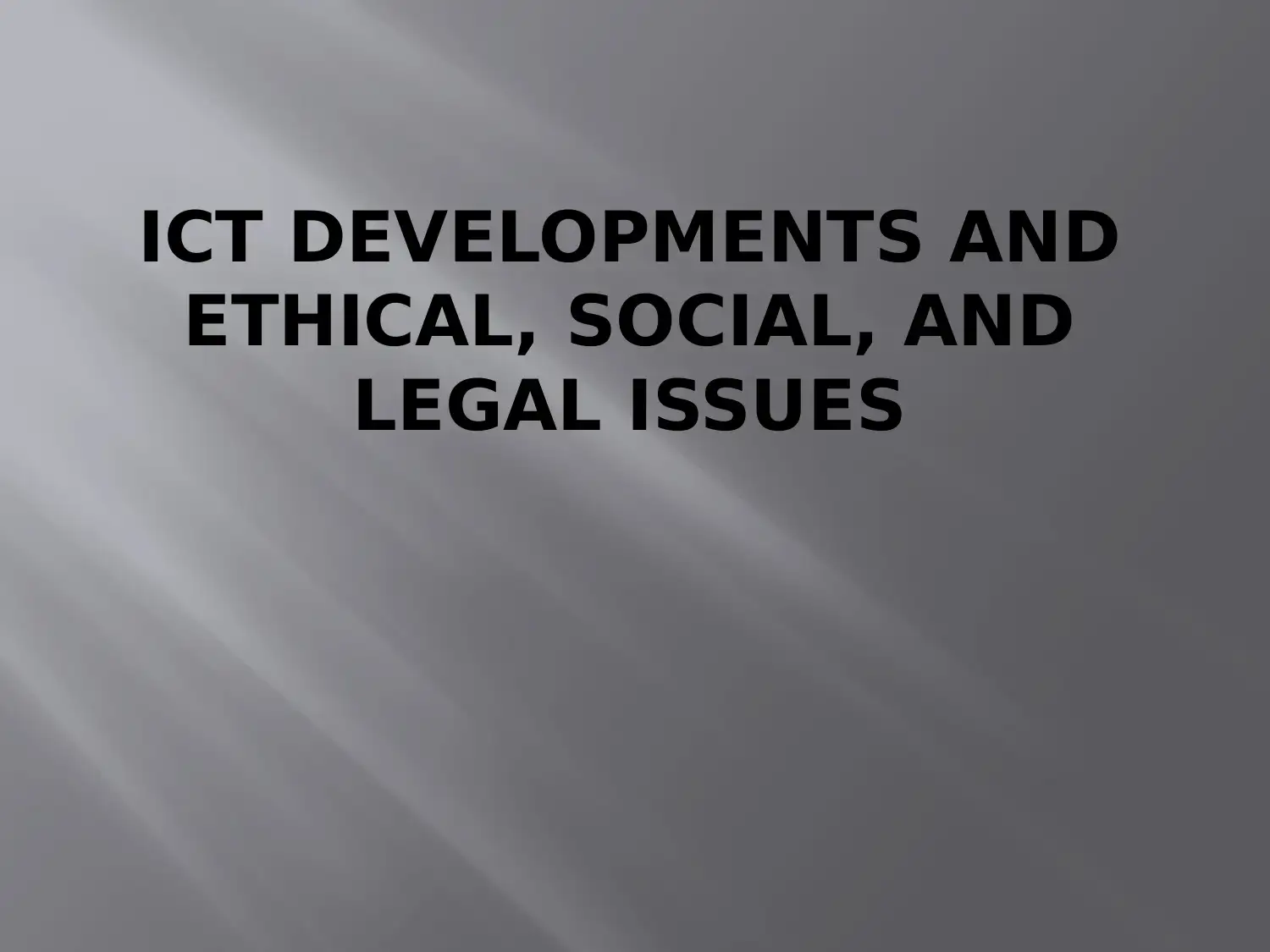
ICT DEVELOPMENTS AND
ETHICAL, SOCIAL, AND
LEGAL ISSUES
ETHICAL, SOCIAL, AND
LEGAL ISSUES
Paraphrase This Document
Need a fresh take? Get an instant paraphrase of this document with our AI Paraphraser
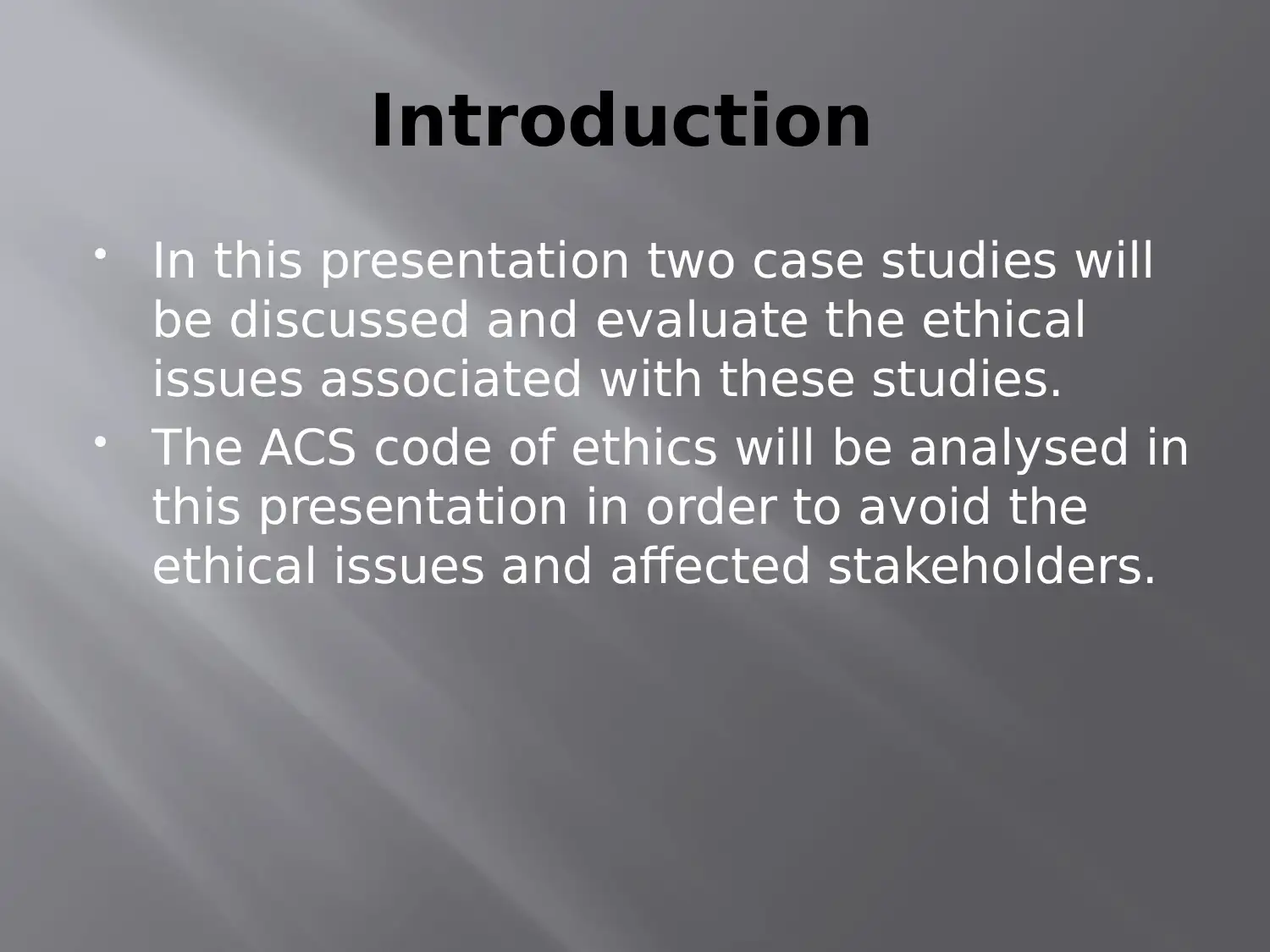
Introduction
In this presentation two case studies will
be discussed and evaluate the ethical
issues associated with these studies.
The ACS code of ethics will be analysed in
this presentation in order to avoid the
ethical issues and affected stakeholders.
In this presentation two case studies will
be discussed and evaluate the ethical
issues associated with these studies.
The ACS code of ethics will be analysed in
this presentation in order to avoid the
ethical issues and affected stakeholders.
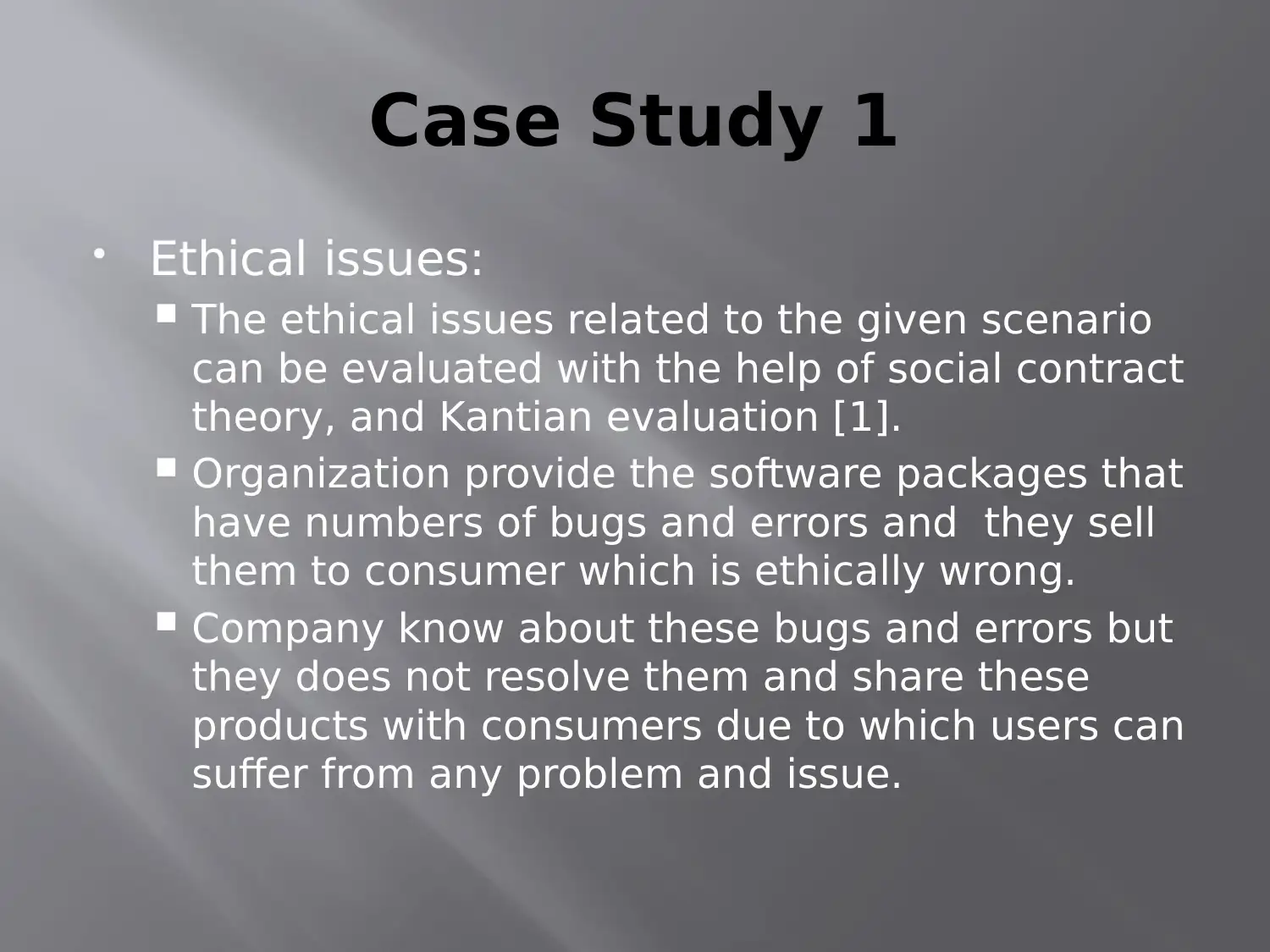
Case Study 1
Ethical issues:
The ethical issues related to the given scenario
can be evaluated with the help of social contract
theory, and Kantian evaluation [1].
Organization provide the software packages that
have numbers of bugs and errors and they sell
them to consumer which is ethically wrong.
Company know about these bugs and errors but
they does not resolve them and share these
products with consumers due to which users can
suffer from any problem and issue.
Ethical issues:
The ethical issues related to the given scenario
can be evaluated with the help of social contract
theory, and Kantian evaluation [1].
Organization provide the software packages that
have numbers of bugs and errors and they sell
them to consumer which is ethically wrong.
Company know about these bugs and errors but
they does not resolve them and share these
products with consumers due to which users can
suffer from any problem and issue.
⊘ This is a preview!⊘
Do you want full access?
Subscribe today to unlock all pages.

Trusted by 1+ million students worldwide
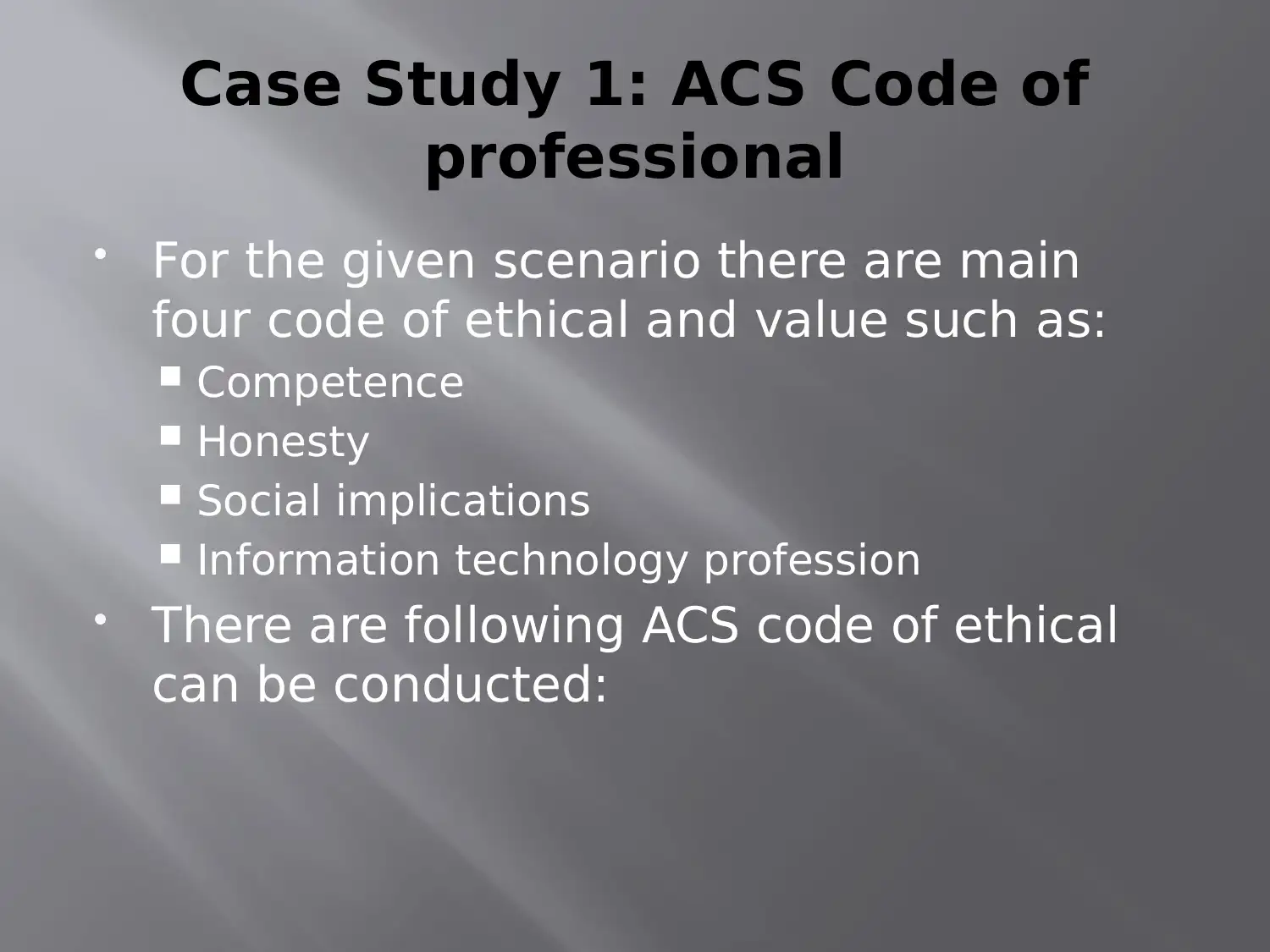
Case Study 1: ACS Code of
professional
For the given scenario there are main
four code of ethical and value such as:
Competence
Honesty
Social implications
Information technology profession
There are following ACS code of ethical
can be conducted:
professional
For the given scenario there are main
four code of ethical and value such as:
Competence
Honesty
Social implications
Information technology profession
There are following ACS code of ethical
can be conducted:
Paraphrase This Document
Need a fresh take? Get an instant paraphrase of this document with our AI Paraphraser
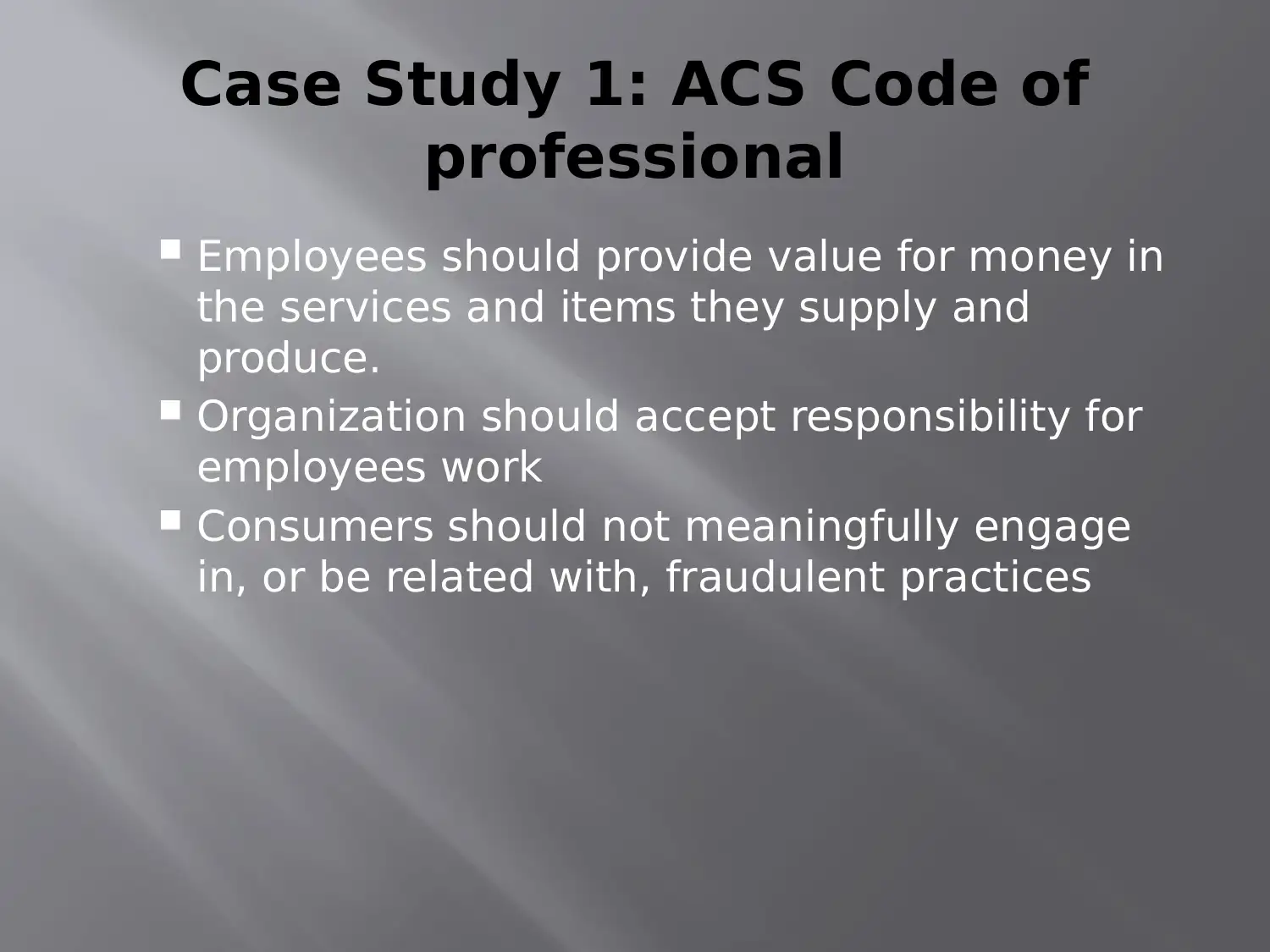
Case Study 1: ACS Code of
professional
Employees should provide value for money in
the services and items they supply and
produce.
Organization should accept responsibility for
employees work
Consumers should not meaningfully engage
in, or be related with, fraudulent practices
professional
Employees should provide value for money in
the services and items they supply and
produce.
Organization should accept responsibility for
employees work
Consumers should not meaningfully engage
in, or be related with, fraudulent practices
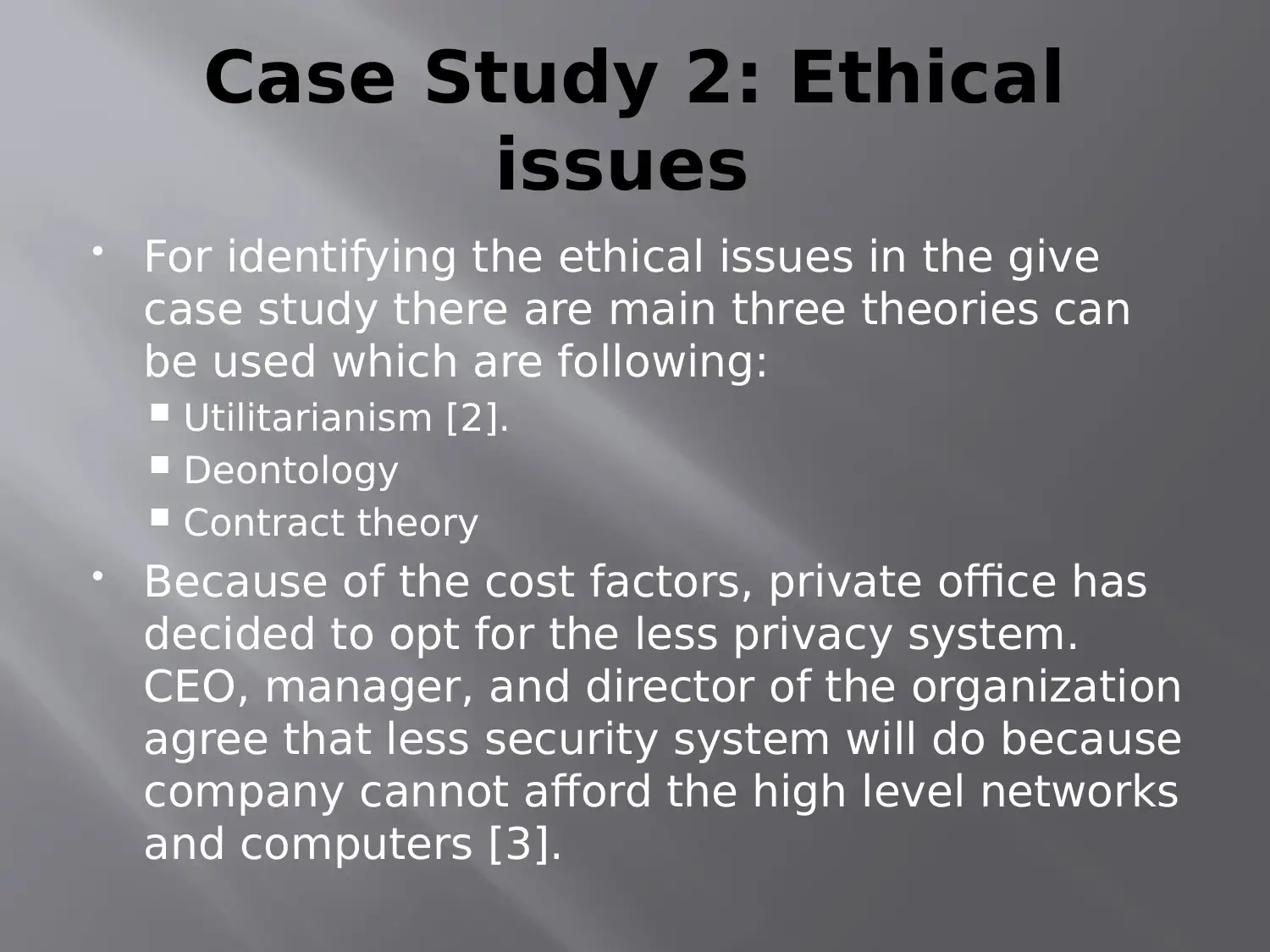
Case Study 2: Ethical
issues
For identifying the ethical issues in the give
case study there are main three theories can
be used which are following:
Utilitarianism [2].
Deontology
Contract theory
Because of the cost factors, private office has
decided to opt for the less privacy system.
CEO, manager, and director of the organization
agree that less security system will do because
company cannot afford the high level networks
and computers [3].
issues
For identifying the ethical issues in the give
case study there are main three theories can
be used which are following:
Utilitarianism [2].
Deontology
Contract theory
Because of the cost factors, private office has
decided to opt for the less privacy system.
CEO, manager, and director of the organization
agree that less security system will do because
company cannot afford the high level networks
and computers [3].
⊘ This is a preview!⊘
Do you want full access?
Subscribe today to unlock all pages.

Trusted by 1+ million students worldwide
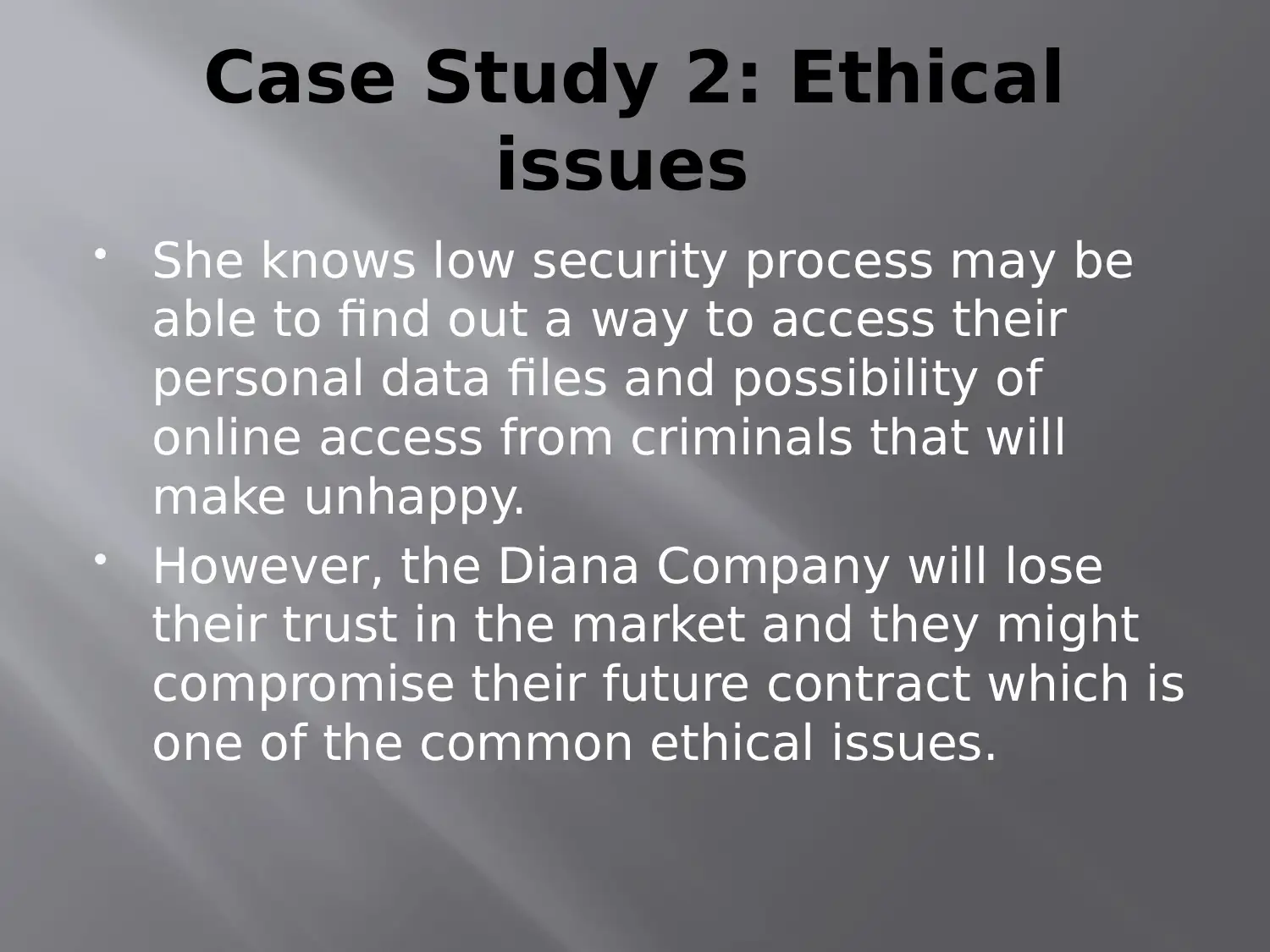
Case Study 2: Ethical
issues
She knows low security process may be
able to find out a way to access their
personal data files and possibility of
online access from criminals that will
make unhappy.
However, the Diana Company will lose
their trust in the market and they might
compromise their future contract which is
one of the common ethical issues.
issues
She knows low security process may be
able to find out a way to access their
personal data files and possibility of
online access from criminals that will
make unhappy.
However, the Diana Company will lose
their trust in the market and they might
compromise their future contract which is
one of the common ethical issues.
Paraphrase This Document
Need a fresh take? Get an instant paraphrase of this document with our AI Paraphraser
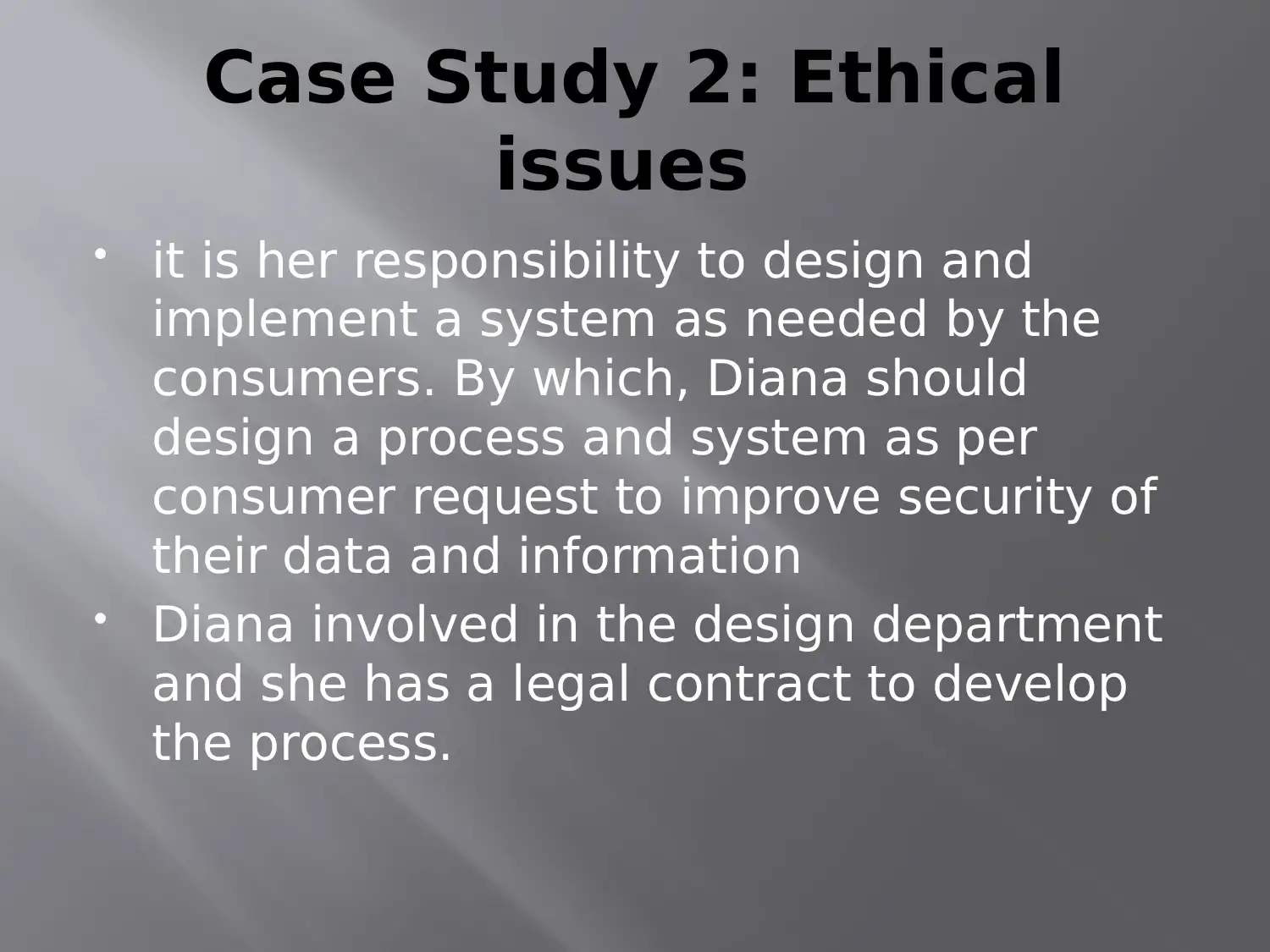
Case Study 2: Ethical
issues
it is her responsibility to design and
implement a system as needed by the
consumers. By which, Diana should
design a process and system as per
consumer request to improve security of
their data and information
Diana involved in the design department
and she has a legal contract to develop
the process.
issues
it is her responsibility to design and
implement a system as needed by the
consumers. By which, Diana should
design a process and system as per
consumer request to improve security of
their data and information
Diana involved in the design department
and she has a legal contract to develop
the process.
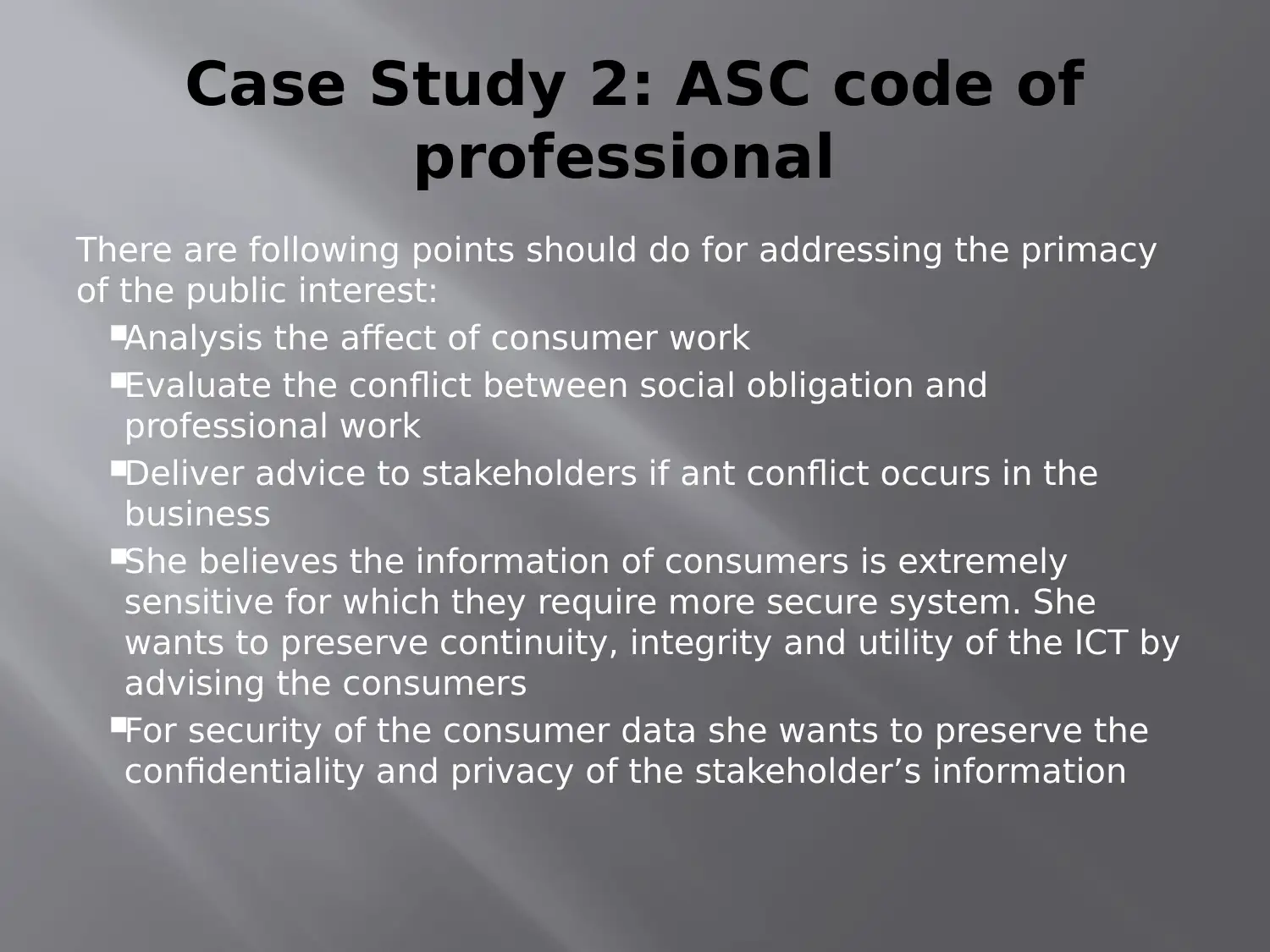
Case Study 2: ASC code of
professional
There are following points should do for addressing the primacy
of the public interest:
Analysis the affect of consumer work
Evaluate the conflict between social obligation and
professional work
Deliver advice to stakeholders if ant conflict occurs in the
business
She believes the information of consumers is extremely
sensitive for which they require more secure system. She
wants to preserve continuity, integrity and utility of the ICT by
advising the consumers
For security of the consumer data she wants to preserve the
confidentiality and privacy of the stakeholder’s information
professional
There are following points should do for addressing the primacy
of the public interest:
Analysis the affect of consumer work
Evaluate the conflict between social obligation and
professional work
Deliver advice to stakeholders if ant conflict occurs in the
business
She believes the information of consumers is extremely
sensitive for which they require more secure system. She
wants to preserve continuity, integrity and utility of the ICT by
advising the consumers
For security of the consumer data she wants to preserve the
confidentiality and privacy of the stakeholder’s information
⊘ This is a preview!⊘
Do you want full access?
Subscribe today to unlock all pages.

Trusted by 1+ million students worldwide
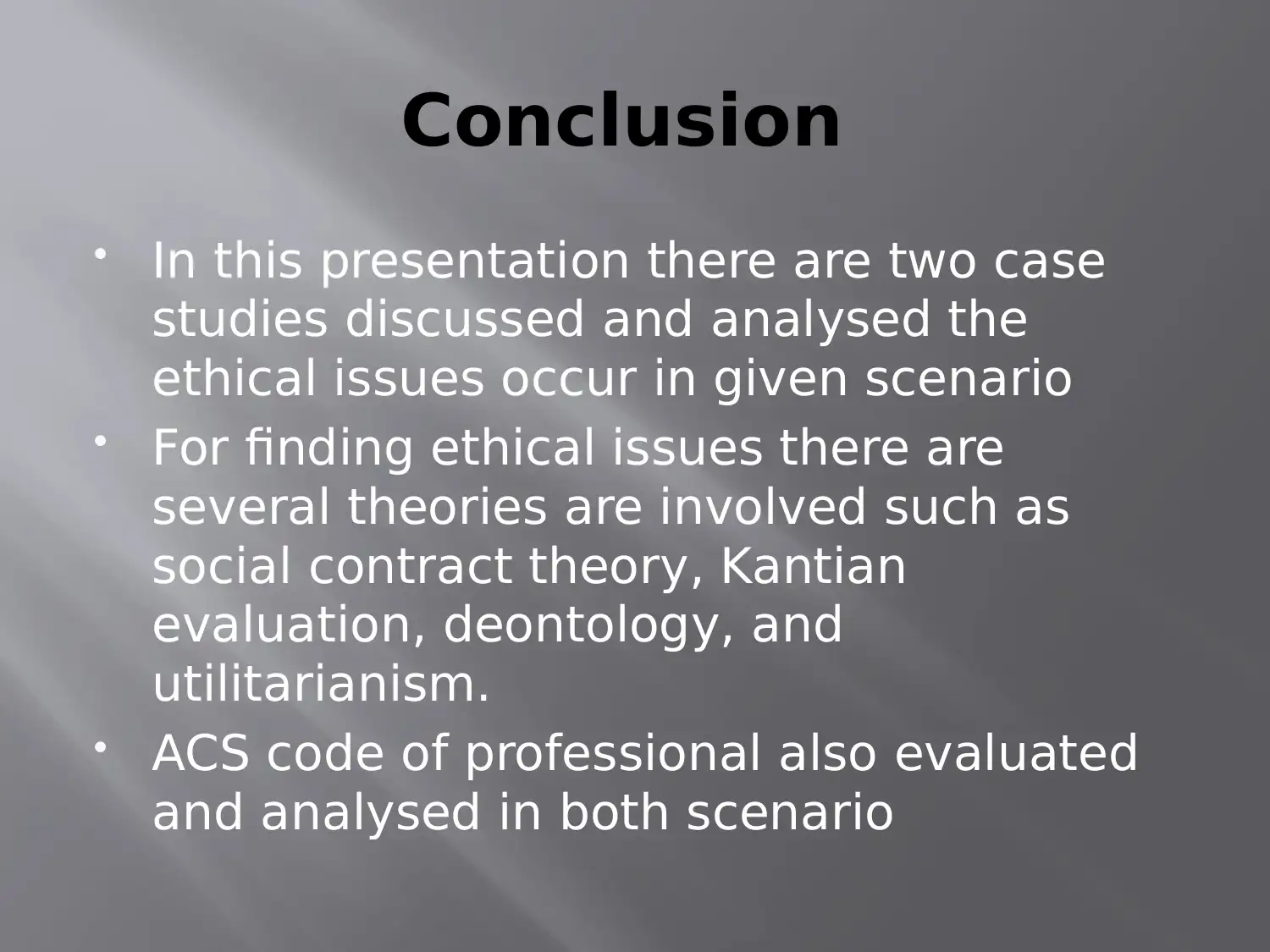
Conclusion
In this presentation there are two case
studies discussed and analysed the
ethical issues occur in given scenario
For finding ethical issues there are
several theories are involved such as
social contract theory, Kantian
evaluation, deontology, and
utilitarianism.
ACS code of professional also evaluated
and analysed in both scenario
In this presentation there are two case
studies discussed and analysed the
ethical issues occur in given scenario
For finding ethical issues there are
several theories are involved such as
social contract theory, Kantian
evaluation, deontology, and
utilitarianism.
ACS code of professional also evaluated
and analysed in both scenario
Paraphrase This Document
Need a fresh take? Get an instant paraphrase of this document with our AI Paraphraser
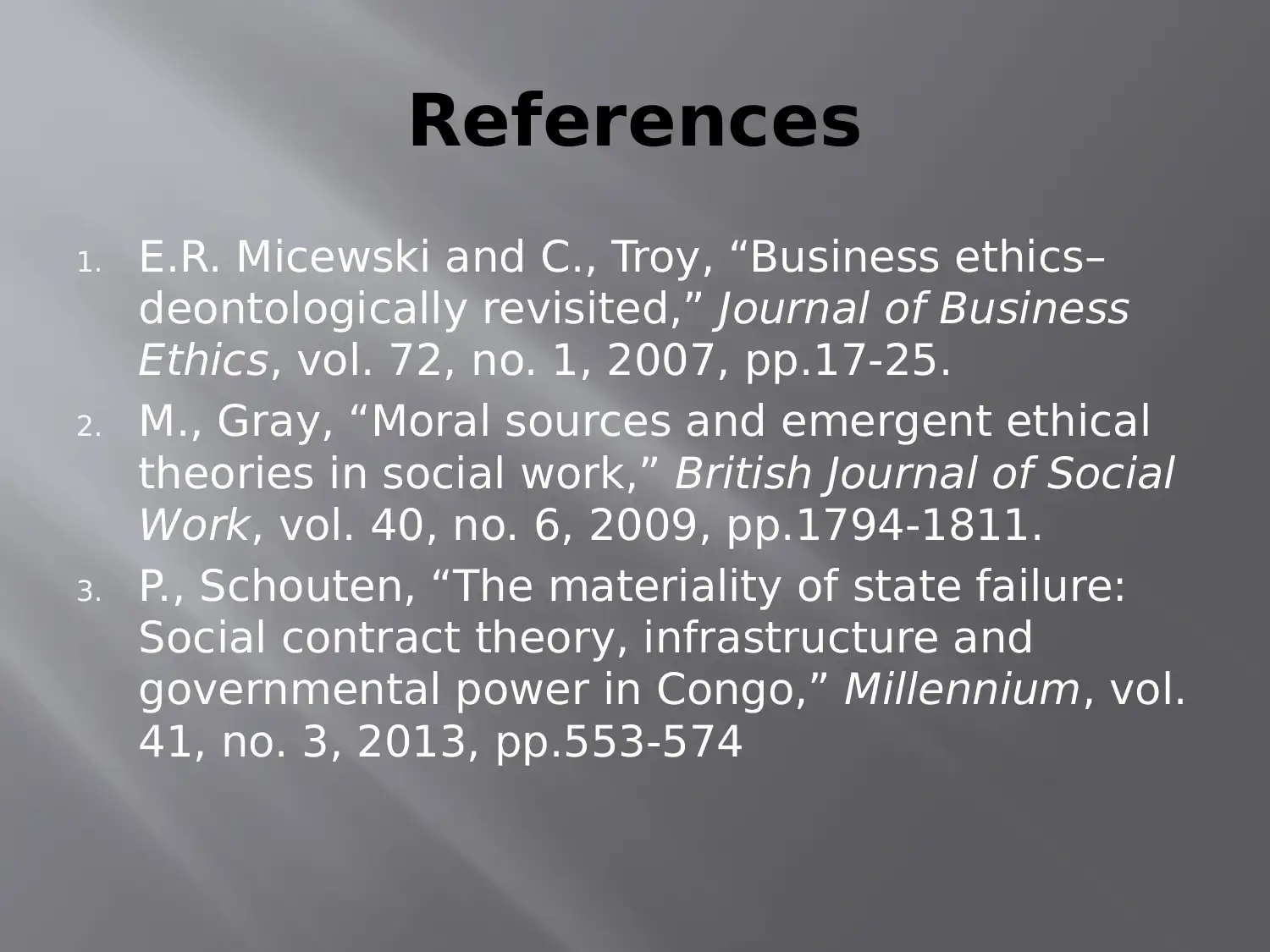
References
1. E.R. Micewski and C., Troy, “Business ethics–
deontologically revisited,” Journal of Business
Ethics, vol. 72, no. 1, 2007, pp.17-25.
2. M., Gray, “Moral sources and emergent ethical
theories in social work,” British Journal of Social
Work, vol. 40, no. 6, 2009, pp.1794-1811.
3. P., Schouten, “The materiality of state failure:
Social contract theory, infrastructure and
governmental power in Congo,” Millennium, vol.
41, no. 3, 2013, pp.553-574
1. E.R. Micewski and C., Troy, “Business ethics–
deontologically revisited,” Journal of Business
Ethics, vol. 72, no. 1, 2007, pp.17-25.
2. M., Gray, “Moral sources and emergent ethical
theories in social work,” British Journal of Social
Work, vol. 40, no. 6, 2009, pp.1794-1811.
3. P., Schouten, “The materiality of state failure:
Social contract theory, infrastructure and
governmental power in Congo,” Millennium, vol.
41, no. 3, 2013, pp.553-574
1 out of 11
Related Documents
Your All-in-One AI-Powered Toolkit for Academic Success.
+13062052269
info@desklib.com
Available 24*7 on WhatsApp / Email
![[object Object]](/_next/static/media/star-bottom.7253800d.svg)
Unlock your academic potential
Copyright © 2020–2026 A2Z Services. All Rights Reserved. Developed and managed by ZUCOL.




